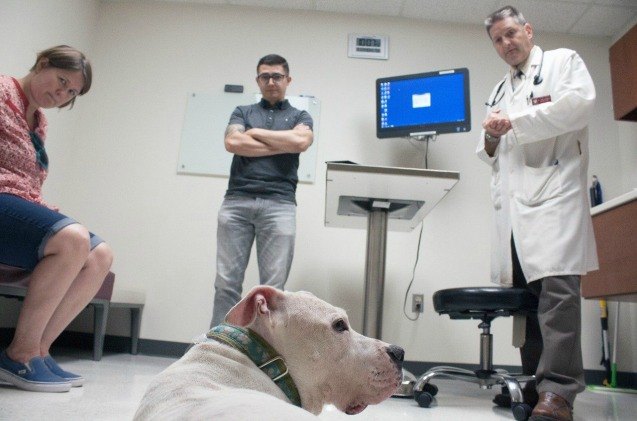Promising New Research For Treating Brain Tumors in Dogs and Humans

A study funded by the National Institutes of Health has produced data from clinical trials that show promising results when it comes to treating brain tumors in humans. The study is a collaboration between the College of Veterinary Medicine at Virginia Teach and the Thomas K. Hearn Brain Tumor Research Center at Wake Forest’s School of Medicine.
Related: Researchers Look To Chinese Herbs To Treat Dog Cancer
Currently, the researchers are looking at the safety of a new chemotherapy medicine and delivery methods when treating brain tumors in dogs, as they want to find a safe and effective use of the drug for use in future trials. Dogs and people have similar brains in many aspects, and researchers are optimistic that the data they’ve found and will find will be beneficial for the treatment of tumors in humans as well.
Dr. John Rossmeisl is a professor of neurology and neurosurgery in the Department of Small Animal Clinical Sciences and said that though dogs are benefitting from this, the drug research is a pathway for use in human cancer treatment as well.
A dog in the trial was originally diagnosed with a glioma brain tumor, and gave a survival of only a few months more. She was treated in the trial, which required her to stay at the vet hospital for six days. She had preliminary lab tests and exams done as well as a tumor biopsy. Once the biopsy was processed, she received chemotherapy drugs specially modified for her tumor, and they were delivered directly to her tumor. This chemotherapy drug is unique in that it works by destroying cancerous cells, and not normal brain cells. She went home the next day.
Since March, she’s only been back twice–six weeks after her infusion and four months later for evaluation, exceeding the projected survival rate that was initially given upon diagnosis. More, her tumor has been significantly reduced. Dr. Rossmeisl says that based on the dog’s initial MRI, it appeared to have shrunk approximately 50%, and in the four-month follow-up, it appears as a teeny little spot, compared to what it once was.
She will continue follow-up care every two to three months, and her owners are thrilled she was able to get the treatment she was.
Related: New Antibody Gives Fresh Hope For Dog Cancer Treatment
Dr. Rossmeisl said that there are different sub-types of gliomas, so not all dogs will respond the same. Some have lived for a year longer, with their tumor shrinking, while other dogs in the study have seen no difference. That said, this drug in previous generations of development have been used safely in human brain tumor studies and trials and he believes this information will apply to humans as well within the next five years.
The trial began in 2014 and still accepts dogs for participation. They are happy with the positive outcomes they’ve had thus far, and believe there is more to come–for our best friends and for us.

More by Lori Ennis























